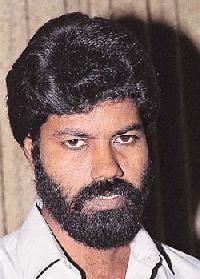
The Liberation Tigers of Tamil Eelam was a Tamil militant organization that was based in northeastern Sri Lanka.
The Tamil United Liberation Front is a political party in Sri Lanka.
Arulappu Richard Arulpragasam ; also known by the names Arular and A. R. Arulpragasam) was a Tamil activist and former revolutionary from Jaffna who had a part in forming the group Eelam Revolutionary Organisation of Students (EROS) in January 1975 in Wandsworth, England during the Tamil independence movements to secure an independent Tamil Eelam. He later left the conflict, after work as an independent peace negotiator between the two sides of the civil war. At the time of his death, he headed the Global Sustainability Initiative in the United Kingdom. He was also the father of the musician M.I.A. and the jewellery designer Kali Arulpragasam.

The Tamil Eelam Liberation Organization (TELO) is an Eelam Tamil organisation which campaigned for the establishment of an independent Tamil Eelam in the northeast of Sri Lanka during 1972-1987 which later accepted the December 19th proposals. The TELO was originally created as a militant group, and functioned as such until 1986, when most of its membership was killed in a conflict with the Liberation Tigers of Tamil Eelam (LTTE). Its surviving members reorganised themselves as a political party, and it continues to function as such today.
Sri Lankan Tamil militant groups rose to prominence in the 1970s to fight the state of Sri Lanka in order to create an independent Tamil Eelam in the north of Sri Lanka. They rose in response to the perception among minority Sri Lankan Tamils that the state was preferring the majority Sinhalese for educational opportunities and government jobs. By the end of 1987, the militants had fought not only the Sri Lankan security forces but also the Indian Peace Keeping Force. They also fought among each other briefly, with the main Liberation Tigers of Tamil Eelam (LTTE) rebel group dominating the others. The militants represented inter-generational tensions, as well as the caste and ideological differences. Except for the LTTE, many of the remaining organizations have morphed into minor political parties within the Tamil National Alliance, or as standalone political parties. Some Tamil militant groups also functioned as paramilitaries within the Sri Lankan military against separatist militants.
Eliyathamby Ratnasabapathy was one of the founder member of the Eelam Revolutionary Organization of Students a Tamil militant group from Sri Lanka and a noted Marxist-Leninist political leader.
The Anuradhapura massacre occurred in Sri Lanka in 1985 and was carried out by the Liberation Tigers of Tamil Eelam. This was the largest massacre of Sinhalese civilians by the LTTE to date; it was also the first major operation carried out by the LTTE outside a Tamil majority area. Initially, EROS claimed responsibility for the massacre, but it later retracted the statement, and joined the PLOTE in denouncing the incident. The groups later accused the LTTE for the attack. Since then, no Tamil militant group has admitted to committing the massacre. However, state intelligence discovered that the operation was ordered by the LTTE's leader Velupillai Prabhakaran. He assigned the massacre to the LTTE Mannar commander Victor and it was executed by Victor's subordinate Anthony Kaththiar. The LTTE claimed the attack was in revenge of the 1985 Valvettiturai massacre, where the Sri Lanka Army killed 70 Tamil civilians in Prabhakaran's hometown.
V. Balakumaran was once one of the two top leaders of the Eelam Revolutionary Organisation of Students (EROS) in Sri Lanka. In 1990, he and large percentage of EROS members left the organization and joined the Liberation Tigers of Tamil Eelam (LTTE). Balakumaran is believed to be active in LTTE's political division.
The Thimpu principles or Thimpu Declaration were a set of four demands put forward by the Sri Lankan Tamil delegation at the first peace talks undertaken regarding the Sri Lankan civil war. In July–August 1985 the Indian government organised peace talks in Thimphu, Bhutan aimed at bringing an end to the Sri Lankan civil war between Sri Lankan Tamil militant groups and the government of Sri Lanka. The declaration made by the Tamil delegation at Thimphu, in response to a government proposal, has come to be known as the Thimpu Declaration or Thimpu principles.

Arumugam Kandaiah Premachandran is a Sri Lankan Tamil militant turned politician and former Member of Parliament. He is the current leader of the Eelam People's Revolutionary Liberation Front (EPRLF), a member of the Tamil National Alliance (TNA).
Kandasamy Iyer Balanadarajah Iyer (Balanadarasan), also known as Sinna Bala, (6 June 1957 – 16 August 2004) was a Sri Lankan Tamil activist, writer and poet who was a media secretary and a senior member of the Eelam People's Democratic Party.
The Tamil Eelam Liberation Army was a Sri Lankan Tamil rebel group. TELA was originally the military wing of the Tamil Eelam Liberation Organization, but split away from TELO in 1982.
The Eelam National Democratic Liberation Front (ENDLF) is a former Indian backed Tamil militant group in Sri Lanka. It was formed in 1987 as an amalgamation of splinter groups from other militant groups. It is currently a pro-government paramilitary group and political party. In August 2011 it was reported that the party is to be deregistered.
The Eelam National Liberation Front (ENLF) was a short-lived (1984–1986) umbrella organisation for leading Sri Lankan Tamil militant groups.

Visvanathan Dharmalingam was a Sri Lankan Tamil politician and Member of Parliament.
Arumugam Murugesu Alalasundaram was an assassinated Sri Lankan Tamil teacher, politician and Member of Parliament.

Nesadurai Thirunesan was a Sri Lankan Tamil militant and one of the founders of the Eelam Revolutionary Organisation of Students.

Kandasamy Pathmanabha was a Sri Lankan Tamil rebel and founder/leader of the Eelam People's Revolutionary Liberation Front (EPRLF), a separatist Tamil militant organisation in Sri Lanka.





